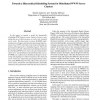Free Online Productivity Tools
i2Speak
i2Symbol
i2OCR
iTex2Img
iWeb2Print
iWeb2Shot
i2Type
iPdf2Split
iPdf2Merge
i2Bopomofo
i2Arabic
i2Style
i2Image
i2PDF
iLatex2Rtf
Sci2ools
142
click to vote
HPDC
1998
IEEE
1998
IEEE
Towards a Hierarchical Scheduling System for Distributed WWW Server Clusters
In this paper we present a model for dynamically scheduling HTTP requests across clusters of servers, optimizing the use of client resources as well as the scattered server nodes. We also present a system, H-SWEB, implementing our techniques and showing experimental improvements of over 250%, which have been achieved through utilizing a global approach to scheduling requests. This is the first system to provide a hierarchical scheduling mechanism for distributedHTTP server clusters incorporatingdynamic client-server task distribution and distributed data access. H-SWEB uses sophisticated scheduling techniques in monitoring and adapting to workload variation at the client and server clusters for supporting typical digital library tasks, such as fast WWW image browsing. We provide a discussion of our system architecture and implementation, and briefly summarize theexperimental results that have been achieved.
Distributed And Parallel Computing | DistributedHTTP Server Clusters | Hierarchical Scheduling Mechanism | HPDC 1998 | Server Clusters |
| Added | 04 Aug 2010 |
| Updated | 04 Aug 2010 |
| Type | Conference |
| Year | 1998 |
| Where | HPDC |
| Authors | Daniel Andresen, Timothy McCune |
Comments (0)

